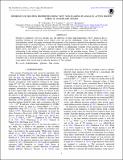Inference of heating properties from "hot" non-flaring plasmas in active region cores. II. Nanoflare trains
Abstract
Despite its prediction over two decades ago, the detection of faint, high-temperature ("hot") emission due to nanoflare heating in non-flaring active region cores has proved challenging. Using an efficient two-fluid hydrodynamic model, this paper investigates the properties of the emission expected from repeating nanoflares (a nanoflare train) of varying frequency as well as the separate heating of electrons and ions. If the emission measure distribution (EM(T)) peaks at T = Tm, we find that EM(Tm) is independent of details of the nanoflare train, and EM(T) above and below Tm reflects different aspects of the heating. Below Tm, the main influence is the relationship of the waiting time between successive nanoflares to the nanoflare energy. Above Tm, power-law nanoflare distributions lead to an extensive plasma population not present in a mono-energetic train. Furthermore, in some cases, characteristic features are present in EM(T). Such details may be detectable given adequate spectral resolution and a good knowledge of the relevant atomic physics. In the absence of such resolution we propose some metrics that can be used to infer the presence of "hot" plasma.
Citation
Barnes , W T , Cargill , P J & Bradshaw , S J 2016 , ' Inference of heating properties from "hot" non-flaring plasmas in active region cores. II. Nanoflare trains ' , Astrophysical Journal , vol. 833 , no. 2 , 217 . https://doi.org/10.3847/1538-4357/833/2/217
Publication
Astrophysical Journal
Status
Peer reviewed
ISSN
0004-637XType
Journal article
Description
This work was supported in part by the Big-Data Private-Cloud Research Cyberinfrastructure MRI-award funded by NSF under grant CNS-1338099 and by Rice University.Collections
Items in the St Andrews Research Repository are protected by copyright, with all rights reserved, unless otherwise indicated.

